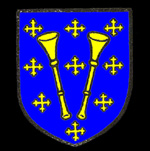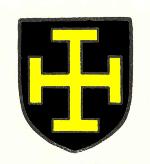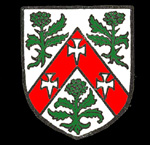Mogerhanger Manor
Domesday Book
At the time of the Domesday Book of 1086, Hugh de Grentmeisnil’s wife, Adeliza (sometimes translated ‘Adelaide’) possessed 10 hides in Chalton; the manor of Moggerhanger, not mentioned in the Survey, apparently was part of this larger property.

The Trumpington family coat of arms
Moggerhanger Manor
One of the earliest owners of Moggerhanger manor was Roger de Trumpington, who held it at his death in 1289, and whose son, Giles, then inherited it. It stayed within the Trumpington family until 1457, when Sir Walter gave it to Maud Enderby in trust for her life, as her son, Richard, was pledged to marry his daughter, Eleanor. Richard Enderby held the manor from 1474 and, after he died only 13 years later, his son, John, transferred ownership to William Gascoigne.

The Aleyn family coat of arms
The manor passed then to the Aleyn family, with John Aleyn possessing it by 1549. In 1677 the manor and lordship of Mogerhanger was conveyed by George Wyan to Thomas Cheyne of Luton, Hugh Mason, citizen and grocer of London and John Adams of London, scrivener [BS627]. Cheyne, Mason and Adams conveyed it to John Platt of Saint Giles' Middlesex for £985 the following year [BS629] and he was still holding it in 1687 [BS633]. The manor was later held by the Astell family, then the Thorntons, with Robert Thornton succeeding his uncle Richard Astell in 1777.

Robert Thornton sold the manor by auction in 1784 [PM1868] and it was bought by his brother Godfrey Thornton. Godfrey died in 1805 and was succeeded by his son Stephen, who did in 1850. The next Lord of the Manor was Godfrey Thornton and on his death in 1857 the manor was again sold by auction [WG2539], this time to his brother William. When William Thornton died without issue in 1864 the Manor of Moggerhanger passed to the Dawkins family of Over Norton, Oxfordshire, then to Richard Mercer around 1888. Richard’s son, Colonel Algernon Mercer, sold it to the Fane family in 1909. A succession of Law of Property Acts in the 1920s abolished copyhold tenure and all manorial fines and incidents thus abolishing the concept of manors in all but name.